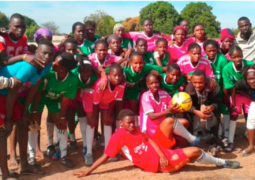The African Society has not given much room for children or young people to involve in discussing issues of sex and sexuality.
This has denied the young the right to know about reproductive health and rights.
The rationale or belief of the African society for denying the young the right to discuss such issues could be regarded as genuine.
The common belief in the African society is that once young children are exposed to discussing sex, they would be tempted or curious to practice it at a tender age. This notion has nursed the culture of silence on sex issues in Africa.
But the world is in a permanent revolution that societies have to conform to if we are to live a progressive, safe and comfortable life.
While the culture of silence over sex persists, cases of unwanted pregnancy continue to increase.
This has caused many girls to yield to forced or arranged marriage at a tender age as a counter measure, despite the risks involved in early marriage and subsequent pregnancies.
Again, since parents and society in general deny the young the right to know about sex issues, the resulting effect is that many teenagers come to know about sex through their peers and get messed up in it in the street.
With the presence of HIV/AIDS, our society is faced with a new challenge, which is "the right to know and to protect oneself" from HIV/AIDS.
One of the most recommended strategies of fighting HIV/AIDS is to raise mass awareness. This has contravened the African system, which has placed a culture of silence on issues of sex and sexuality. In fact, the strategy has faulted the African society for observing a tradition that denies young children the right to fully know about sex issues.
In observing such a tradition, many young people grow from childhood to adolescent to adulthood without knowing much about their reproductive health.
That is why many girls get shocked and confused when they experienced menstruation for the first time.
Many, in fact, cry and wonder out of ignorance over such happening.
They get confused as it always appears unexpectedly.
The situation clearly shows that the individual has not received the information that she should have received on such matters.
Again, in most cases, when parents are consulted by their children after such experience, they speak in riddles instead of telling the children the truth.
The act of beating by the bush, in many circumstances, increases the child's vulnerability to unplanned or unwanted teenage pregnancy, sexually transmitted infections (STI) and HIV/AIDS.
The African culture, though diverse and rich in nature, but treats the issue of sex as sacrosanct. We should learn to conform to the changing times.
With the advent of technology and globalization so much has changed, even within the African culture, where it is common practice to have the youth engaged in sexual activity, and the society has very little to say about the cultural heritage that is so much abused.
The youth of Africa are faced with the challenge of HIV/AIDS and poverty, poor economies, bad and governance and corruption, high rates of youth unemployment, intergenerational dependence and so many other challenges.
The increasing rate of crimes being committed by young people makes me want to dissociate myself from the youth of Africa.
But guess what? Change must happen if we want the future to be bright, promising and safe for our children and grandchildren.
We don't have to live with the examples of our leaders, we can begin to build a legacy all on our own, and we will succeed if we are Committed.
We should participate actively in making decisions, and in implement the policies and programmes that will help our communities become better places to live.
We should also form partnerships with our siblings, parents, friends, peers, communities, states or nations, governments and other partners in development.
EDITOR'S NOTE:
This article was first published on 12th September 2006 on this paper.
Read Other Articles In Article (Archive)
The waste management issue
Jul 19, 2012, 1:53 PM



